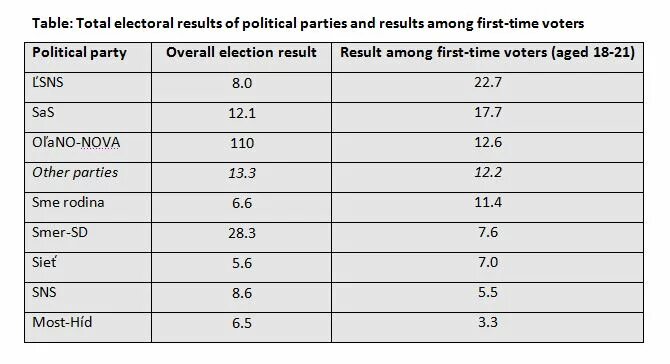
The paraphrase above of the 2007 Coen Brothers’ movie title “No Country for Old Men” has recently become a catchy metaphor for the sentiment of many young people in Central and Eastern Europe. Its provocative “claim” is unfortunately substantiated and strong empirical evidence exists of a high proportion of young people ready to leave their country to study, work and live abroad.

Introduction
The paraphrase above of the 2007 Coen Brothers’ movie title “No Country for Old Men” has recently become a catchy metaphor for the sentiment of many young people in Central and Eastern Europe. Its provocative “claim” is unfortunately substantiated and strong empirical evidence exists of a high proportion of young people ready to leave their country to study, work and live abroad. In 2016 a Eurobarometer survey found that 32% of young people in Slovakia are ready to leave their country (to say nothing of how many have already done so). The percentage of youngsters ready to leave was 24% in Hungary and 16% in Poland. On the other hand, the result was 1% in Germany, 8% in the United Kingdom and 12% in France.[1] While the motivation of young people to move abroad can be due to different background factors, it can nevertheless be assumed that this motivation is also somehow connected with the political situation and the state of public affairs.
Let´s list some arguments in support of this thesis: a young female voter from Czech Republic says that mainstream parties are only interested in families and retirees/seniors, while young people who are childlesss and single are not their target group. No public policies are designed for such people and politicians pay minimal attention to their life situations.[2] Moreover, standard politics is boring and cannot attract or speak to young people. Surveys also repeatedly reveal that youngsters have a deep distrust of state institutions. According to a poll conducted in the V4 countries in 2017, more than 80% of young people distrust the Government or Parliament, 6% do not trust the courts, and trust in political parties is marginal. Most importantly, young people feel excluded. They are not included in decision-making processes that affect them and society condemns them to passivity.[3] Similar results were also provided by the Institute for Strategic Analysis of the Slovak Academy of Sciences in the autumn of 2017: 26% of people aged 18 to 24 years were said to not follow domestic politics and to never read any articles about it. Up to 41% said they read articles about Slovak politics in the press or on the Internet less than once a week.[4] Well, then someone comes along, someone who uses simple, informal language to explain complex problems, someone who points the finger at the allegedly guilty ones who have caused the general misery, proposes a quick and radical solution, and then that someone ... wins elections among young people!
How young people vote, if they vote at all
Young people vote differently than do members of the older generations. This trend is seen in almost each democratic country. Above all, they vote less often than older people do. As surveys regularly show, their interest in political affairs is weaker and their mobilization to participate in elections (or other forms of public participation) is lower than that of older voters. International comparative surveys of electoral behaviour show that age is an important variable that influences election participation. The reasons are diverse - weak political socialization, lack of voting habits, and the many other considerably more appealing things that attract their attention. When asked the reasons for their low interest and low attendance, young people list mainly their lack of knowledge of how the political system works, their growing distrust in political institutions and leaders, and their lack of time for politics because of their demanding living conditions. Young people also often point out that they are not apathetic, but that they feel excluded from traditional political processes and do not believe their participation could mean anything.
Who do the youth vote for if they do vote?
Let´s use Slovakia as an example. In the 2016 parliamentary elections, the decisions made by first-time voters showed a new pattern - the electoral winner was Marián Kotleba's extreme right-wing People’s Party – Our Slovakia (ĽSNS), followed by Freedom and Solidarity (SaS). The results for the party Sme rodina (We Are family) were also above average. On the other hand, traditional parties like Smer-SD, Most-Híd, as well as the Slovak National Party (SNS), which "scored" among older voters, completely failed when it came to first-time voters.[5]
The gender gap in youth decision-making is also interesting - a third of the young male first-time voters chose right-wing extremists, almost twice as often as female first-time voters did. On the other hand, the new party of Boris Kollár, Sme rodina, targeted women and thus was more often chosen by female first-time voters.The inclination of young voters towards extreme political parties contrasts with what Slovakia experienced in the critical parliamentary elections of 1998 and 2002. In 1998 young voters were targeted by a mobilization campaign (“Get out the vote!”) by non-governmental organizations based on the assumption that, because of their political values profile, young voters (especially first-time voters without previous election experience) would cast votes for one of the parties of the "anti-Mečiar coalition", while in 2002 it was anticipated they would vote for one of the pro-reform, pro-integration-oriented parties. Youngsters were part of the solution then, but today they are posing a problem. What has changed? What went wrong? This is a generation that has already grown up in a democratic environment, has no personal experience of a totalitarian regime, lives in the best possible times in terms of the economic performance of a country with open borders and can study, work, and settle in any state of the European Union. The fact is, however, that today's young generation - which is already politically visible, relevant, and strongly claimed their rights in the 2016 elections - experienced neither the spirit of November 1989, nor the 1998 elections, nor the 2004 accession to the EU. Present-day Slovakia offers just pragmatic, very passive strategies for public engagement, unpersuasive visions and not much idealism. There is nothing that could emotionally excite and encourage young people to participate.
What is the situation in other countries?
Elsewhere the situation is very similar, although the degree of radicalism varies. In any case, there are new, non-standard, protesting, anti-establishment parties that are winning the hearts, minds and votes of young voters. In the Czech elections in October 2017, the new non-traditional Pirates’ Party won among the young. In Poland in 2015 the 18- to-29-year-olds voted mainly for the party of Jaroslav Kaczynski, Law and Justice (PiS), although the nationwide result for this political party was significantly higher (29% vs. 38%). The second-strongest party was the protest movement Kukiz, which was established by a popular rockstar whose profile and program are not clear. In Hungary, the most popular among youngsters are the right-wing extremists of JOBBIK.[6]
What can be done?
There are no easy solutions. This is not a problem of young people only. They are just products of the societies in which they grow up and are politically socialized. We can list many connections - the failing education system that is still based on memorizing facts rather than critical thinking; the omnipresent corruption; the political elites focused only on their own problems and the next elections; the consequences of globalization and migration, in the form of increased competition and feelings of cultural endangerment. On the other hand, we see several positive signals - many initiatives at the local level show that young people are increasingly interested in the public space that surrounds them in their everyday life. At this level of governance, those who are not engaged and interested in “big politics” have a greater chance of experiencing satisfaction from the positive impact of their own activities. It is important to talk to youngsters - at all levels and through all available channels - to explain the implications of their participation, to offer then facts and a different view of the world, and to discuss with them without a sense of moral superiority and presenting ourselves as “the owners of truth”. In any case, however, it is important not to avoid this dialogue and not to exclude even the young adherents of radicalism with the explanation that we do not talk with this “kind” of people.
The Exit, Voice or Loyalty project[7] suggests one “recipe” is the support of young “opinion leaders” who are more acceptable authorities for the youngsters than political party “dinosaurs”.
However it is also very important that democratically-minded people not stand aside. One feature of the current development is a decline in civic participation. However, as the 2016 Slovak elections showed, alternative, radical parties can successfully mobilize voters who do not feel a close affinity with the principles of liberal democracy. The well-known Hungarian political scientist Béla Greskovits talks about two phenomena that are currently threatening the quality of democracy - “hollowing” and backsliding.[8] Both are associated with changing participation - democracy is being emptied by the declining political engagement of democratically-minded citizens in connection with the mobilization and radicalization of less democratic ones. Differentiated voters’ participation, depending on the degree of their belief in the principles of liberal democracy, may lead to a further rise of radicals at the expense of mainstream politicians in the next elections. The 2017 regional elections in Slovakia in the Banská Bystrica Region, where the chairperson of the ĽSNS, Marián Kotleba, tried to get re-elected, showed that extremism can be defeated or at least marginalized by efficiently mobilizing democratically-minded people.
Epilogue
This article has been written by the end of 2017. In early March 2018 an unprecedented political crises erupted in Slovakia. Young investigative journalist Jan Kuciak (27) and his fiancée Martina Kusnirova were found shot dead in their home. Mr. Kuciak worked as a reporter of the news website Aktuality.sk and he focused mainly on investigating tax fraud of several businessmen with connections to top-level Slovak politicians from the ruling party Smer-SD. It is very likely that the assassination of two young people was related to Jan Kuciak´s investigative journalism. This tragedy trigged a massive political crisis. Opposition parties, media, and citizens requested drawing of political responsibility by resigning the Interior Minister, but the Prime Minister as well. As the consequence Slovakia has experienced the biggest protests since the Velvet Revolution in November 1989. More than 120,000 people took to the streets in Slovakia and also abroad. The protest we organized and participated mostly by young people. These events and massive civic mobilisation might have an impact on views and attitudes of Slovakia’s youth on democracy and public participation.
[1] Bayer, Lily (2016): Why Central Europe’s youth roll right, accessible at: https://www.politico.eu/article/why-central-europes-youth-roll-right-voting-politics-visegard/
[2] Procházková, Andrea – Lauder, Silvie (2017): Generace selfie rozhodne volby [Selfie generation will decide the election], Respekt 39/2017, ss. 16-21.
[3] Prieskum Rady mládeže Slovenska: Táto krajina nie je pre mladých. [Survey the Youth Council> No country for young men] 27. September 2017. Accessible at: https://mladez.sk/2017/09/27/prieskum-rady-mladeze-slovenska-tato-krajina-nie-je-pre-mladych/
[4] Ľudia neovládajú politické reálie, mladých politika nezaujíma vôbec. [People do not know facts about politics, young people are not interested in politics at all] Euractiv 15.12. 2017. Accessible at: https://euractiv.sk/tlacove-spravy/buducnost-eu/prieskum-institutu-strategickych-analyz-sav/
[5] Gyárfášová, Oľga - Slosiarik, Martin (2016): Voľby do NR SR 2016: Čo charakterizovalo voličov. [2016 general election: What characterized the voters] Working Papers in Sociology 1 / 2016, on-line: http://www.sociologia.sav.sk/pdf/Working_Papers_in_Sociology_012016.pdf.
[6] https://www.politico.eu/article/why-central-europes-youth-roll-right-voting-politics-visegard/
[7] Kucharczyk, Jacek – Łada, Agnieszka – Schöler, Gabriele (2017): EXIT, VOICE OR LOYALTY? Young People on Europe and Democracy. Case Studies from Austria, the Czech Republic, Germany, Hungary, Poland and Slovakia. Instytut Spraw Publicznych, Warszawa; Bertelsmann Stiftung, Gütersloh. Accessible at: http://www.ivo.sk/buxus/docs//publikacie/subory/Exit_voice_or_loyalty.pdf
[8] Greskovits, Béla (2015): “The Hollowing and Backsliding of Democracy in East Central Europe”. Global Policy Volume 6; supplement 1, pp. 28-37.